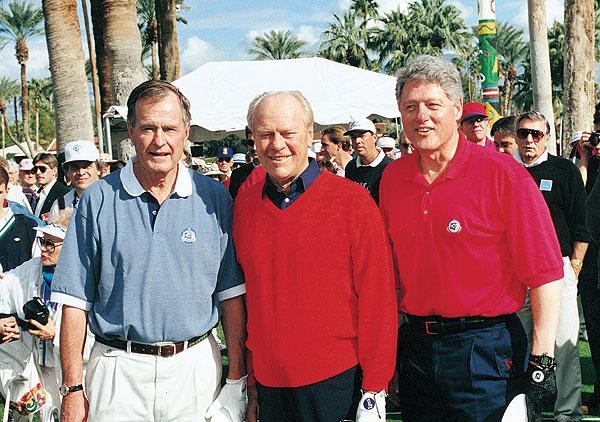
Gerald Ford was very briefly vice president of the United States and, following the resignation of Richard Nixon, somewhat less briefly president of the United States. He was an affable fellow, strangely guileless and yet a groundbreaker at what now gets little recognition: He was the first ex-president to sell the presidency.
Within a year of leaving office (1977), Ford had earned something like $1 million. He sat on corporate boards (20th Century Fox, for instance) and made paid speeches. He was available for conventions, meetings, and, I was told, the opening of a shopping center. A modest man of once-modest means, he soon had a home near Palm Springs and another one near Vail, where he liked to ski.
The shocking thing is how not shocking any of this now is — although Bill Clinton might be shocked at how little Ford made. Once upon a time, presidents left office and led monkish lives. They were not expected to accept outside income — except for book royalties, of course — and virtually none of them did. (Calvin Coolidge wrote a newspaper column, no way to get rich.)
Until 1958, former presidents did not even get a pension. (It’s now a bit more than $200,000 annually.) That changed when Congress took pity on Harry Truman and awarded him and Herbert Hoover pensions and funds for staff. Dwight Eisenhower left the White House with a nice nest egg. He had made a small fortune with his World War II memoir, Crusade in Europe, for which the government gave him a sweetheart tax deal.
John Kennedy followed Ike into the White House, and he, in turn, was succeeded by Lyndon Johnson. LBJ might have been a man of elastic morality, but he pretty much kept to his ranch, wrote the required memoir, and abjured buckraking.
Richard Nixon wrote books and sold a TV interview to David Frost, but paid speeches were not his thing.
Then came Ford, and everything changed. Skipping Jimmy Carter, who adhered to the Old Way, Ronald Reagan picked up where Ford left off. He made two speeches in Japan for $2 million. George H.W. Bush also gave paid speeches, but no one has raked it in quite like Bill Clinton and, of course, Hillary Clinton. The figures are astounding, virtual GDPs of small nations, some of which have given one Clinton or another a dictator’s ransom to say a few words.
A Nigerian newspaper group paid Bill Clinton $700,000 for a single speech. I’m sure it did wonders for circulation. The amounts for the Clintons are impressive indeed. Bill Clinton reported being paid more than $104 million from 2001 through 2012, just for speeches. He has become a very wealthy man, and I suppose I should say more power to him.
But while the numbers are astonishing, they are also troubling. Unless money ain’t money no more, someone is buying and someone is selling. The question is: What? Mostly, I would think, bragging rights. The nice people at Goldman Sachs or JPMorgan Chase did not pay to hear Hillary Clinton because they were getting privileged information. (It’s rare that anyone gets any information at all out of her.) What they were buying was proximity, the chance to take a selfie with her. These are groupies in Guccis, and they go off confiding to others what Clinton has confided to them — which is what was in the morning newspapers anyway. It would be cheaper to buy the paper.
There is nothing illegal in any of this. But it is troubling. The figures are so huge that one can speculate that a future president might curry favor with the awesome rich as a way of ensuring a voluptuous retirement. I mean, why make enemies out of people who will gladly pay you to say nothing much — and fly you on a private jet just to say it? It’s a nice life.
Jerry Ford also got on the boards of Shearson/American Express, Beneficial Corporation of New Jersey, and other companies and soon became rich. I suspect no one hired him for his expertise or his business acumen, asking him about interest-rate swaps, buybacks, or, in 20th Century Fox’s case, whether to open a movie in the summer or wait for the Christmas crowd. He sold what they were buying, which was the prestige of the presidency. As a result, it has less and less.